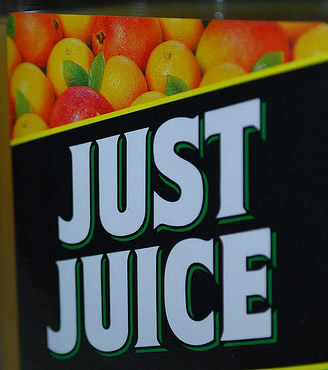 Since the release of Appetite for Destruction we’ve talked a lot about Coke and other liquid lollies. Surely juice is better for us?
Since the release of Appetite for Destruction we’ve talked a lot about Coke and other liquid lollies. Surely juice is better for us?
Kiwis certainly think so. More than a third of the population drinks juice 3 or more times per week, compared with a quarter that do the same with soft drink. However, this comfort with fruit juice as a ‘healthy option’ is misplaced. The extent of processing used to produce fruit juice means that there is little, if anything, to separate it from a soft drink.
How can this be? The World Health Organisation advises us to cut down on our intake of ‘free sugars’. This includes all refined sugars added to foods in the home or the factory, plus some natural sugars like honey, syrups and yes even fruit juices. At the same time we are told we are supposed to have at least five servings of veggies and fruit a day (and only one of these can be from juice). So what makes fruit juice a lesser beneficial food than fruit?
The sugar in fruit comes bound up with nutrients and fibre, which is why we’re encouraged to eat fruit. But if you juice the fruit and remove the fibre, bingo we have a ‘free sugar’. Just because we need to eat more fruit doesn’t mean that drinking juice is helpful – it depends on how much natural goodness (nutrients, vitamins, fibre) is left in it for the calories consumed. Without the fibre in fruit juice to slow your digestion of the natural sugars, it is way less beneficial for your body, and too much can be harmful.
Surely there are other goodies left in the juice though? Nutrients and stuff? Yeah sure there are but consider where we get most of our juice. The bulk brands like Keri, Just Juice, Real McCoy and Fresh Up are all made from concentrate (most of them also use apple juice to bulk up their juices). So the fruit is picked, squeezed, then pasteurised to kill the bugs and make it last longer before finally being heated to evaporate some water. Then it can be shipped around the world cheaply, and the water re-added when it gets to New Zealand. Not many nutrients will survive this process, which is why they have to add Vitamin C back in so their juice has at least some.
Without the fibre and most of the nutrients, the major component left in the juice is sugar. And many juices have just as much sugar as soft drinks, sometimes even more. ‘Simply Squeezed’ orange juice (which incidentally isn’t ‘simply’ squeezed at all, it is actually a blend of freshly squeezed and from concentrate juice) comes with added sugar to give it 11.7g per 100ml – more than Coke. Most juice brands seem to hover between 9g and 11g of sugar per 100ml. The only exception we found was V8 original vegetable juice which was 3.7g (although it had a bit of salt in it too for flavour – you can’t win with processed food!).
Ribena has had its share of scandals in the past few years, and seems to have been reformulated to drop the sugar content and boost the Vitamin C so that it can actually live up to the claims of its marketing. There is still more sugar in it than there is blackcurrant juice.
Finally, sickest of all we have the products that are marketed to look like juice but aren’t juice at all. Keri ‘Orange Fruit Drink’ is a good example. It isn’t called juice, because that would just be lying. But it is called Orange, and there is a big orange on the front of the pack just to make you comfortable that it has some natural origins. Not much though – it is 16% orange from concentrate, lots of sugar and 5% orange pulp just to give it that ‘real feel’. Enough to fool a busy shopper into giving their kids a sugar drink thinking it is something healthier.
In short, at best juice should be a treat like all sugar fixes – it isn’t something that can be guzzled with impunity. The best thing that can be said about most fruit juices is that they come in smaller serving sizes than liquid lollies like Coke.

